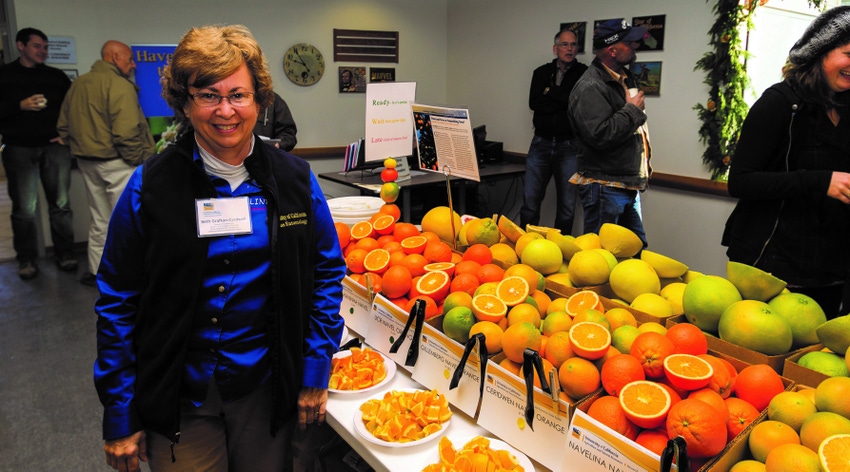
A career that began by addressing pesticide resistance in citrus is ending much the same way. Three decades after her work to test and study new chemistries that since became a mainstay for growers, work begins again as new generations of insects have developed resistance to common products.
When Beth Grafton-Cardwell began her entomology career with the University of California 30 years ago growers faced few tools to control troublesome insects. As an entomologist her focus was not merely to help find chemical means to kill insects; rather, she wanted growers to learn integrated pest management protocols that would wean them, and the industry, away from the broad-spectrum carbamates and organophosphates that presented multiple concerns.
After a lengthy and rewarding career as an Extension entomologist and director of a citrus research center in the heart of California's commercial citrus production region, Grafton-Cardwell will retire in late June.
History
Grafton-Cardwell says she was always a biologist at heart. "I always loved nature and had bugs in jars in my room," she said.
Looking ahead to adulthood the idea crossed her mind to attend medical school and become a doctor "because that's what people do when they like biology," she continued. This idea changed as she neared the end of her undergraduate studies when she took an entomology class as an elective.
"I really enjoyed the fact that instead of being one of 400 nameless students in this huge mass of premed, I was one of 30 students that the professor knew by name. I saw that I could apply my interest in biology and an interest in helping people in agriculture."
From her undergraduate studies at U.C. Berkeley, she moved onto Purdue University, where she earned her master's degree in entomology. Five years later, and after a return trip to Berkeley, she had her Ph.D. in entomology.
From her urban upbringing, Grafton-Cardwell began her post doctorate work on integrated pest management (IPM) in cotton and almonds.
"When you do IPM it's not so important what crop you're working on because the principles that you learned about biological control are similar," she said.
With that training, she was hired in 1990 by UC Riverside as a citrus IPM specialist to help address control methods for Red scale and thrips.
"These insects were wildly out of control, Red scale in particular because of resistance," she said. "The main thrust in those days was to get off the pesticide treadmill, and you can do that one of two ways."
Those included biological control, such as the Aphytis wasp; and, finding new pesticides that would allow natural enemies to survive while knocking back populations of troublesome pests. Together with colleagues she was successful in developing controls for Red scale and thrips.
"We were quite successful," she said.
Footsteps
Monique Rivera, an entomologist at UC Riverside and colleague collaborating on the southern California surveys, said she's learned much from Grafton-Cardwell in the two years she's been working with her and is somewhat disappointed to see her retire. She was quick to point out that filling Grafton-Cardwell's shoes may be impossible for a single person.
"I don't know how fillable her shoes are," Rivera said. "Hopefully the university understands the mission to focus on the citrus industry and its current challenges. I can't cover southern California and handle the Valley at the same time."
Jim Gordon, a Tulare County citrus farmer and longtime director on the Citrus Research Board commented on Grafton-Cardwell's "loyalty to the industry," which Gordon said she may have done to a fault.
"There were times she probably should have said 'no' to a project," he said.
Rivera likewise used the word "loyal" to describe Grafton-Cardwell's service to the citrus industry.
"She's been a loyal part of the California citrus industry and I wouldn't be where I am today professionally if it wasn't for her," Rivera said.
Rivera further praised Grafton-Cardwell for her "Extension mindset," which first and foremost has been the dissemination of actionable information for the grower community she serves.
Rivera warned that the citrus industry cannot afford a lengthy process by the University of California to replace Grafton-Cardwell with another qualified citrus entomologist who can take on the specific challenges of California's fresh market citrus industry.
Grafton-Cardwell says she will assume emeritus status with the University of California and may continue work she admits needs to be finished.
About the Author(s)
You May Also Like






